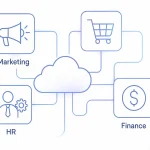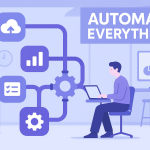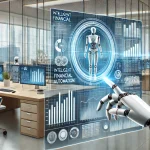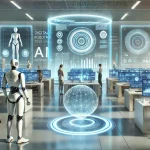Future of Work: How Intelligent Automation Will Shape Jobs by 2030
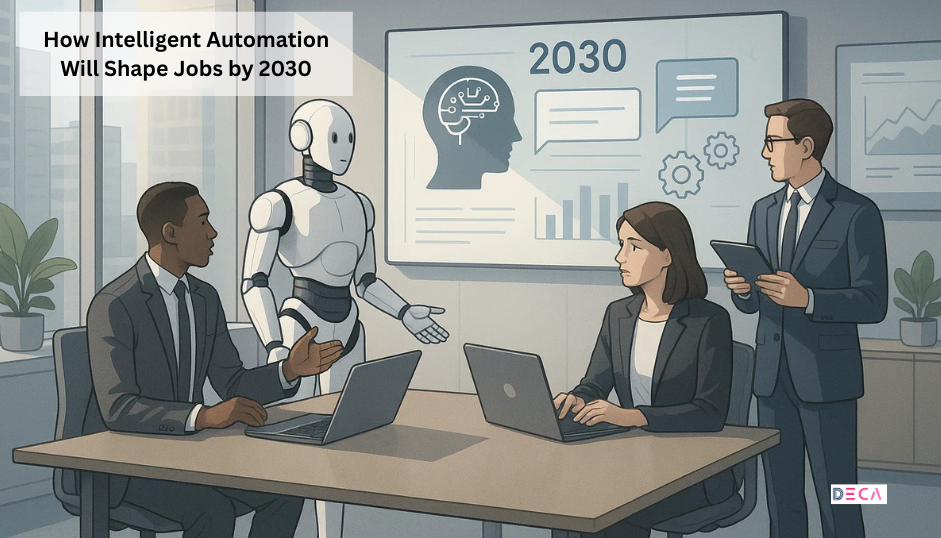
Future of work: how intelligent automation will shape jobs by 2030 is one of the most pressing questions for both businesses and employees today. With rapid advancements in Robotic Process Automation (RPA), Artificial Intelligence (AI), and machine learning, the way we work is already changing—and by 2030, these technologies will redefine industries, job roles, and skills.
Instead of asking “Will automation take away jobs?” the more accurate question is: “How will automation reshape the jobs of tomorrow?”
In this blog, we’ll explore how intelligent automation is transforming the workplace, the opportunities it creates, the challenges it brings, and what skills will matter most in the coming decade.
What is Intelligent Automation?
Intelligent automation combines the efficiency of RPA with the decision-making power of AI.
- RPA automates repetitive, rule-based tasks (like data entry, invoice processing, and reporting).
- AI adds intelligence—analyzing unstructured data, recognizing patterns, making predictions, and learning from feedback.
Together, these technologies create “digital coworkers” that can handle both routine and semi-complex tasks, freeing up human employees for more creative, strategic, and relationship-driven work.
The Evolution of Work in the Next Decade
By 2030, intelligent automation is expected to touch nearly every sector. Here’s how the future of work will look:
- Routine jobs will shrink. Tasks like data entry, scheduling, or processing standard forms will be almost fully automated.
- Hybrid jobs will grow. Humans and AI will collaborate, where machines handle repetitive work and humans provide judgment, empathy, and creativity.
- New job categories will emerge. Just as the internet created web developers, digital marketers, and social media managers, intelligent automation will create new roles like AI trainers, bot managers, and automation strategists.
- Upskilling will be essential. Workers will need to learn new digital skills, from managing automation tools to leveraging AI insights in decision-making.
How Intelligent Automation Will Shape Jobs by 2030
1. Customer Service Roles Will Evolve
AI-powered chatbots and virtual assistants already handle FAQs and basic troubleshooting. By 2030, they will manage most first-level support, while human agents focus on complex, sensitive, or emotional customer needs.
Impact: Customer service professionals will shift toward roles requiring empathy, problem-solving, and managing escalations.
2. Administrative Tasks Will Be Largely Automated
From scheduling meetings to managing travel bookings and handling expense reports, much of today’s administrative workload will be automated.
Impact: Administrative professionals will transition into operations analysts or automation supervisors, overseeing digital systems instead of performing manual tasks.
3. Data-Driven Jobs Will Surge
Automation generates enormous amounts of data. By 2030, companies will need experts who can interpret this data and turn it into actionable insights.
Impact: Roles like data analysts, AI specialists, and automation consultants will see major demand.
4. Manufacturing and Logistics Will Be Smarter
Factories and warehouses are already adopting robotics. By 2030, intelligent automation will optimize entire supply chains—from predicting demand to automating inventory management.
Impact: Manual labor jobs may decline, but new jobs will arise in robotics maintenance, AI system monitoring, and logistics optimization.
5. Healthcare Will Be Augmented, Not Replaced
Automation will support doctors by analyzing medical scans, predicting health risks, and handling paperwork. However, human expertise will remain central.
Impact: Healthcare workers will spend less time on admin tasks and more time on patient care and decision-making.
Opportunities Created by Intelligent Automation
- New Industries: Intelligent automation will create startups and industries we cannot yet imagine.
- Increased Productivity: Businesses will achieve more with fewer resources.
- Job Enrichment: Employees will shift from repetitive work to creative, impactful tasks.
- Global Accessibility: Small businesses will use automation to compete with large enterprises.
Challenges and Risks
While automation creates opportunities, it also brings challenges:
- Job Displacement: Routine, low-skill jobs may be reduced.
- Skills Gap: Workers who fail to upskill may struggle to find employment.
- Ethical Questions: AI decision-making raises concerns about fairness, transparency, and accountability.
- Over-Reliance on Tech: Businesses must maintain balance between human and digital roles.
Skills That Will Matter Most by 2030
To thrive in the age of intelligent automation, employees should focus on skills that machines cannot easily replicate:
- Critical Thinking and Problem-Solving
- Creativity and Innovation
- Emotional Intelligence and Empathy
- Digital Literacy and AI Tool Management
- Collaboration Across Human + Machine Teams
Preparing for the Future of Work
For businesses:
- Start small with automation projects, then scale.
- Invest in upskilling programs for employees.
- Redesign roles to blend automation with human strengths.
For employees:
- Learn digital skills now—RPA tools, AI platforms, and data analytics.
- Focus on soft skills machines can’t replicate.
- Be adaptable; job roles will evolve continuously.
Final Thoughts
Future of work: how intelligent automation will shape jobs by 2030 is not about replacing humans but about redefining the human role. Routine tasks will be handled by digital workers, while humans will focus on creativity, empathy, and strategy.
At DecaSoft Solutions, we help businesses harness RPA, AI, and intelligent automation to prepare for the future of work. Whether you’re looking to automate repetitive processes or redesign workflows for 2030, we can guide your journey.
— Ready to future-proof your business? Contact DecaSoft Solutions today.
